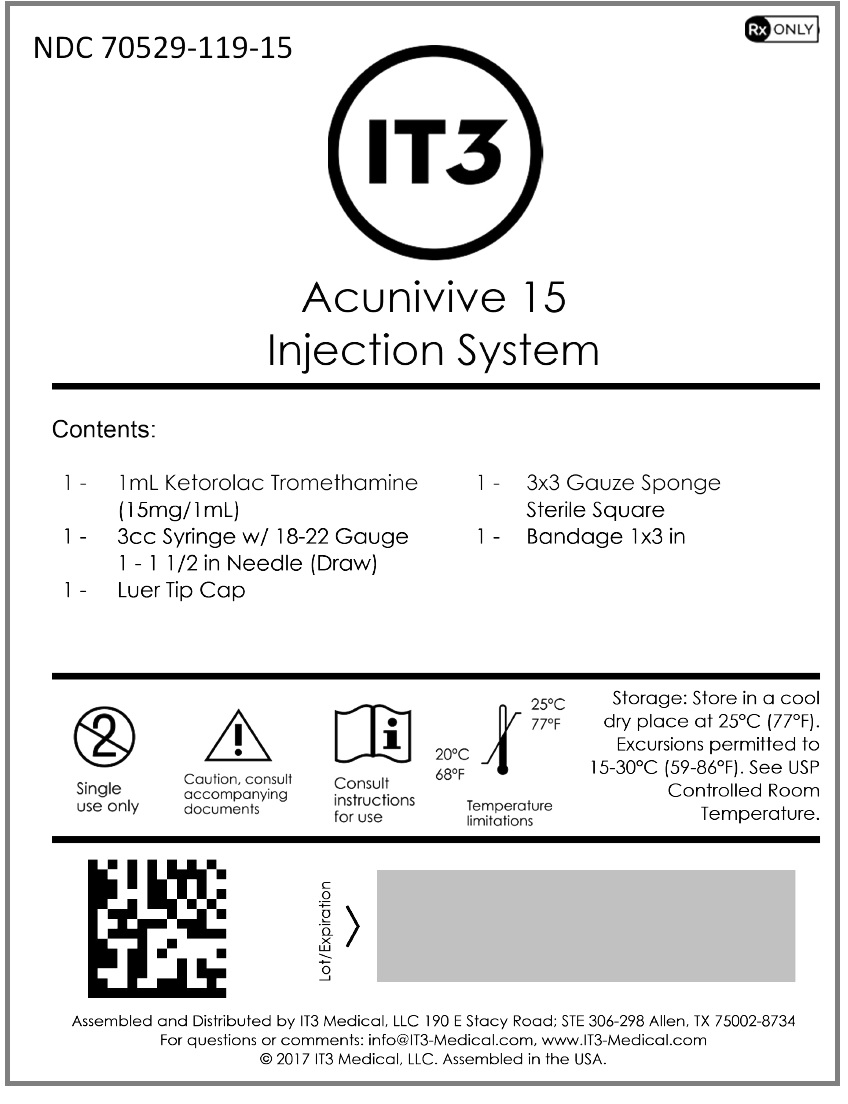Acunivive 15 | Ketorolac Tromethamine Injection while Breastfeeding

What is Acunivive 15 | Ketorolac Tromethamine Injection used for?
Is using Acunivive 15 | Ketorolac Tromethamine Injection unsafe in breastfeeding? Can there be bad consequences for baby if I use it while breastfeeding?

Nursing Mothers Limited data from one published study that included 10 breastfeeding women 2-6 days postpartum showed low levels of ketorolac in breast milk and were undetectable (less than 5 ng/mL) in 4 of the patients. After a single administration of 10 mg of ketorolac tromethamine, the maximum milk concentration observed was 7.3 ng/mL, and the maximum milk-to-plasma ratio was 0.037. After 1 day of dosing (10 mg every 6 hours), the maximum milk concentration was 7.9 ng/mL, and the maximum milk-to-plasma ratio was 0.025. Assuming a daily intake of 400 to 1,000 mL of human milk per day and a maternal body weight of 60 kg, the calculated maximum daily infant exposure was 0.00263 mg/kg/day, which is 0.4% of the maternal weight-adjusted dose. Exercise caution when ketorolac is administered to a nursing woman. Available information has not shown any specific adverse events in nursing infants; however, instruct patients to contact their infant's healthcare provider if they note any adverse events.
Acunivive 15 | Ketorolac Tromethamine Injection Breastfeeding Analsys
Ketorolac tromethamine while Breastfeeding
SafeCAS Number: 74103-06-3
Excretion into breast milk is insignificant and safe for pediatric treatment. Since the possibility of harmful effects on the blood and kidney among treated patients is controversial (not through breast milk) high dosing would better be avoided within 21 days post delivery. Keratolac eye drops are very safe because a low content of drug. The American Academy of Pediatrics rates it usually compatible with breastfeeding.
Acunivive 15 | Ketorolac Tromethamine Injection Breastfeeding Analsys - 2
Ketorolac tromethamine while Breastfeeding
CAS Number: 74103-06-3
Limited data indicate that milk levels of ketorolac are low with the usual oral dosage, but milk levels have not been measured after higher injectable dosages. Use caution when using systemic ketorolac in nursing mothers, especially with the injectable drug. Maternal use of ketorolac eye drops would not be expected to cause any adverse effects in breastfed infants. To substantially diminish the amount of drug that reaches the breastmilk after using eye drops, place pressure over the tear duct by the corner of the eye for 1 minute or more, then remove the excess solution with an absorbent tissue.
I am nursing mother and I have already used Acunivive 15 | Ketorolac Tromethamine Injection, what should I do?
As usage of Acunivive 15 | Ketorolac Tromethamine Injection is mostly safe while breastfeeding hence there should not be any concern. In case of any change in behavior or health of your baby you should inform your health care provider about usage of Acunivive 15 | Ketorolac Tromethamine Injection else no further action is required.
My health care provider has asked me to use Acunivive 15 | Ketorolac Tromethamine Injection, what to do?
Definitely, Acunivive 15 | Ketorolac Tromethamine Injection is safe in lactation for baby. No wonder your doctor has recommended it.
If I am using Acunivive 15 | Ketorolac Tromethamine Injection, will my baby need extra monitoring?
No extra baby monitoring required while mother is using Acunivive 15 | Ketorolac Tromethamine Injection
Who can I talk to if I have questions about usage of Acunivive 15 | Ketorolac Tromethamine Injection in breastfeeding?
US
National Womens Health and Breastfeeding Helpline: 800-994-9662 (TDD 888-220-5446) 9 a.m. and 6 p.m. ET, Monday through Friday
UK
National Breastfeeding Helpline: 0300-100-0212 9.30am to 9.30pm, daily
Association of Breastfeeding Mothers: 0300-330-5453
La Leche League: 0345-120-2918
The Breastfeeding Network supporter line in Bengali and Sylheti: 0300-456-2421
National Childbirth Trust (NCT): 0300-330-0700
Australia
National Breastfeeding Helpline: 1800-686-268 24 hours a day, 7 days a week
Canada
Telehealth Ontario for breastfeeding: 1-866-797-0000 24 hours a day, 7 days a week
